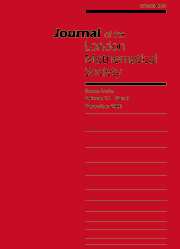Crossref Citations
This article has been cited by the following publications. This list is generated based on data provided by
Crossref.
Hambly, B.M.
Kersting, G.
and
Kyprianou, A.E.
2003.
Law of the iterated logarithm for oscillating random walks conditioned to stay non-negative.
Stochastic Processes and their Applications,
Vol. 108,
Issue. 2,
p.
327.
Biggins, J. D.
and
Kyprianou, A. E.
2004.
Measure change in multitype branching.
Advances in Applied Probability,
Vol. 36,
Issue. 2,
p.
544.
Biggins, J. D.
and
Kyprianou, A. E.
2004.
Measure change in multitype branching.
Advances in Applied Probability,
Vol. 36,
Issue. 2,
p.
544.
Pardo Millan, Juan Carlos
2008.
On the rate of growth of Lévy processes with no positive jumps conditioned to stay positive.
Electronic Communications in Probability,
Vol. 13,
Issue. none,
Vigon, Vincent
2011.
(Homogeneous) Markovian bridges.
Annales de l'Institut Henri Poincaré, Probabilités et Statistiques,
Vol. 47,
Issue. 3,
Shi, Zhan
2015.
Branching Random Walks.
Vol. 2151,
Issue. ,
p.
45.
Chen, Xinxin
2015.
A necessary and sufficient condition for the nontrivial limit of the derivative martingale in a branching random walk.
Advances in Applied Probability,
Vol. 47,
Issue. 3,
p.
741.
Chen, Xinxin
2015.
A necessary and sufficient condition for the nontrivial limit of the derivative martingale in a branching random walk.
Advances in Applied Probability,
Vol. 47,
Issue. 03,
p.
741.
de Raphélis, Loïc
2017.
Scaling limit of multitype Galton–Watson trees with infinitely many types.
Annales de l'Institut Henri Poincaré, Probabilités et Statistiques,
Vol. 53,
Issue. 1,
He, Hui
Liu, Jingning
and
Zhang, Mei
2018.
On Seneta–Heyde scaling for a stable branching random walk.
Advances in Applied Probability,
Vol. 50,
Issue. 2,
p.
565.
Buraczewski, Dariusz
Dyszewski, Piotr
and
Kolesko, Konrad
2019.
Local fluctuations of critical Mandelbrot cascades.
Annales de l'Institut Henri Poincaré, Probabilités et Statistiques,
Vol. 55,
Issue. 2,
Basrak, Bojan
and
Planinić, Hrvoje
2021.
Compound Poisson approximation for regularly varying fields with application to sequence alignment.
Bernoulli,
Vol. 27,
Issue. 2,
Basrak, Bojan
and
Kevei, Péter
2022.
Limit theorems for branching processes with immigration in a random environment.
Extremes,
Vol. 25,
Issue. 4,
p.
623.
Pitman, Jim
and
Tang, Wenpin
2022.
Hidden symmetries and limit laws in the extreme order statistics of the Laplace random walk.
The Annals of Probability,
Vol. 50,
Issue. 4,




